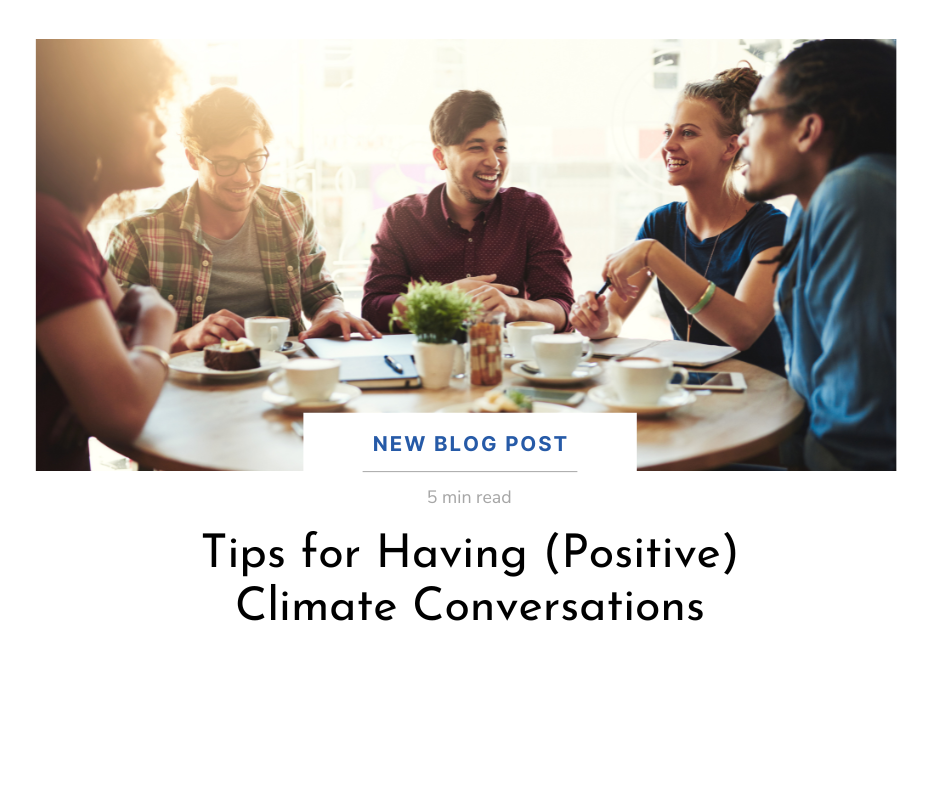Even though most people in the U.S. know climate change is impacting our environment, our health, and our economy, there are still misconceptions about the actual scientific consensus, how it will impact our community, and the fact that it's caused by human activity. On top of these misconceptions, we're not actually talking about climate change in our day-to-day! According to renowned climate scientist Katharine Hayhoe, the most important thing we can do to address climate change is to talk about it (and avoid giving into despair!). (Watch her Ted Talk).
How can talking about climate change really be effective?
Studies show that only 3/4 of people in the whole U.S. don’t even hear somebody else talk about climate change more than once or twice a year. Only one in five Americans (20%) understand that nearly all climate scientists (more than 90%) are convinced that human-caused global warming is happening. These misunderstandings are a major obstacle in our progress to plan for a safe, healthy, and resilient future. That's why it’s crucial to have climate conversations with those around us to clear up misinformation and inspire positive action. When approached in the right way and between two people who trust each other, having these conversations can be persuasive.
As gatherings with family, friends, and co-workers ramp up during the holiday season, it can be difficult to navigate discussions about potentially divisive issues. Climate change can fall into that category for many.
But if we don’t start a conversation, who will?
It’s more important than ever that we tackle the climate crisis, and discussions are a powerful (and underestimated) tool. Use some of your holiday chats to broach the subject and inspire your friends and family!
Struggling with how to have a meaningful climate discussion? Read on for useful tips!
Before You Talk
- Check your sources! Make sure you aren’t spreading misinformation if you discuss particular studies and facts.
- Take some time to think about who you're talking with. What is important to them? How could climate change impact their interests and how could taking action benefit them? Most importantly, see if you can find a value you both share (parenting, the local economy, outdoor activities, etc.) — you’re bound to have something in common you can start your discussion with. Also consider and do some research on how these specific impacts are visible in your own community. Share the impacts that we're facing in Danvers.
During your Discussion
Share your own stories. Talk about how you have experienced the effects of climate change yourself or the particular concerns you have. What actions have you already taken? Who was the particular event or person who made you care about it?
Ask questions! Ask the person you’re talking to if they’ve noticed the same impacts you have and make a connection to climate change. See how climate change is impacting Danvers.
Listen. Be open and listen to how the other person reacts when you bring up climate change. If they agree with you or seem receptive, you may want to extend the conversation, especially to topics you know they care about.
Validate. Make sure you’re validating the other person’s opinions and contributions. It’s important they know you understand them and their concerns.
Empower. Suggest simple actions your conversation partner can take. Share steps you have taken, what resources you consulted or lessons you learned. Is there a Facebook page that posts useful info? Share your resources!
Bonus Points: Younger generations will be deeply affected by climate change. How do we explain it to them? Look into how to talk about climate change with your children - we have a list of kid-friendly resources!
In the Resilient Danvers CASPR planning process, we are prioritizing discussing how to address climate change in our community. But we need your help to keep the conversation going!
Make sure you read up on how the Town is taking action and check out Danvers' greenhouse gas emissions data (spoiler alert: cars and homes are big ones!)
Sign up for our email list to stay connected.
Previous Post
Climate Change & Public Health
Next Post
All About Trees in Danvers


